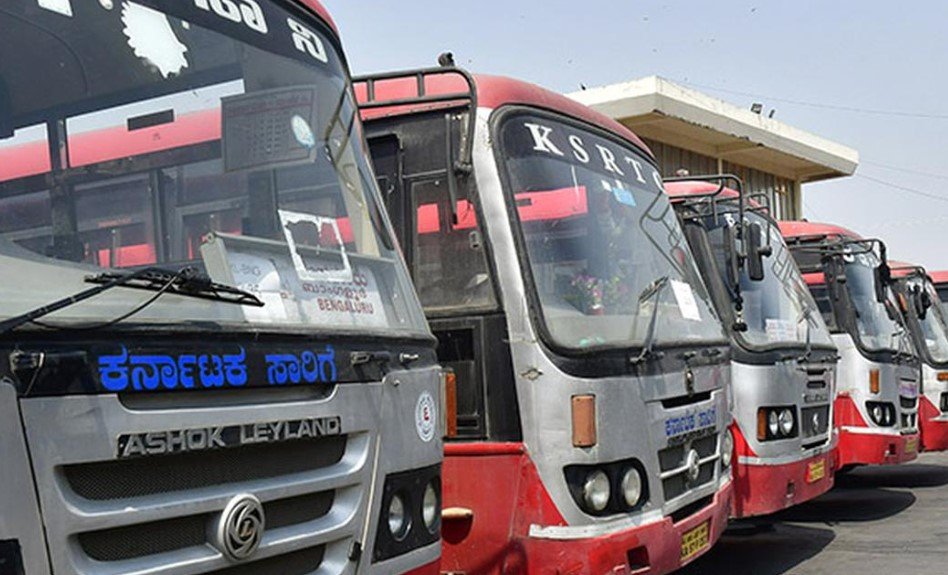An indefinite transport strike that began Tuesday morning is already straining Bengaluru’s famously gridlocked roads, with public buses off the streets and thousands of daily commuters scrambling for alternatives.
The city, home to India’s largest IT workforce, is on high alert as KSRTC employees dig in their heels over longstanding wage and staffing issues.
Work-from-Home Becomes Lifeline for Tech Workers
In a city that breathes IT, the government’s first move was clear — get people off the roads. On Monday night, just hours before the strike began, an advisory was rushed out asking IT firms to allow employees to work from home until further notice.
Tech parks in Whitefield, Manyata, and Electronic City were eerily quiet this morning.
Infosys, Wipro, and TCS — all major employers in Bengaluru — reportedly activated remote work protocols by 8 a.m., helping avoid what could’ve been a complete meltdown.
One HR manager at a major fintech startup put it bluntly: “It’s chaos out there. Half our team pinged in from home. The rest? Stuck somewhere on Outer Ring Road.”
Why Are Bus Workers Striking?
It’s not just about wages. It’s about dignity.
KSRTC and BMTC workers, many of whom haven’t received full salaries for months, are demanding regularization of contract workers, payment of pending dues, and better working conditions. Union leaders say their appeals have fallen on deaf ears.
“This isn’t sudden,” said D. Ramesh, a senior driver who’s been with BMTC for 22 years. “We’ve written letters, protested silently, waited. Nothing changed. Now we’re forced to shout.”
And they are shouting — loudly.
The workers’ union has also flagged rising diesel costs and the state’s increasing reliance on private operators to fill service gaps. They say it’s slowly bleeding public transport dry.

Commuters Left Stranded Across the City
By 9 a.m., major bus depots like Majestic, Shivajinagar, and KR Market were deserted. Empty platforms. Closed shutters. Confused passengers.
Ramesh Shetty, a janitor who commutes daily from Yelahanka to Indiranagar, was left stranded. “I waited 40 minutes. Nothing came. Then I walked.”
He’s not alone.
• Ola and Uber prices surged by nearly 3x during peak hours
• Auto-rickshaw drivers refused short-distance rides
• Bike taxi apps crashed multiple times due to sudden demand
And with schools reopening this week, parents scrambled to make alternative drop-off arrangements.
A Quick Glance at What’s Affected
Here’s a snapshot of how the strike is impacting daily life:
| Sector | Status |
|---|---|
| BMTC city buses | Completely shut |
| KSRTC intercity buses | 90% services halted |
| Metro services | Operational, but overcrowded |
| App-based transport | Running, but expensive and patchy |
| Schools/colleges | Most open, but many students absent |
| IT Companies | Majority shifted to work-from-home |
Police, Volunteers Step In — But It’s Not Enough
The Bengaluru Traffic Police (BTP) deployed extra personnel across junctions known for snarls — Silk Board, Hebbal, Tin Factory, to name a few. But with buses off the road, even their best efforts felt like sticking a Band-Aid on a bullet wound.
Some citizens came forward to help.
Shravan Rao, a 26-year-old MBA student, offered free carpool rides via Instagram. “If I can take three people with me to Koramangala, why not?”
But heartwarming as these gestures are, they barely scratch the surface in a city of over 12 million.
Politicians Caught Off-Guard
The timing couldn’t have been worse for the ruling state government. With Assembly sessions ongoing and budget talks on the table, the optics of empty bus stands and frustrated citizens didn’t sit well.
Opposition parties wasted no time. BJP MLAs staged a walkout on Tuesday morning demanding immediate talks with union leaders.
In a brief media statement, Transport Minister Ramalinga Reddy urged calm. “We are willing to talk. The strike is unfortunate. But holding public hostage won’t help.”
Union leaders responded sharply. “Talks? We’ve been asking for months. They only listen when the city suffers,” said V. Chandrashekar, a union spokesperson.
Strike Could Last Longer Than Expected
While many hoped the protest would be symbolic and short-lived, signs on Day 1 suggest otherwise. With no formal talks scheduled yet, and union support swelling in districts beyond Bengaluru, this could stretch on.
Sources within the transport ministry hinted at a “closed-door emergency meeting” late Tuesday evening, but no breakthroughs were reported.
And with Raksha Bandhan and Independence Day around the corner, things could get messier.
One senior official admitted, “If this isn’t resolved in 48 hours, we’re looking at a logistical nightmare.”
What Next for Bengaluru?
That’s the question haunting everyone from software engineers to street vendors.
Some schools are considering shifting to online classes temporarily. Ride-hailing apps are scrambling to offer incentives to drivers. Offices that had begun in-person work last month are rethinking plans.
Meanwhile, the average citizen waits.
Stuck in traffic. Or at home. Or walking to work because there’s no other way.
